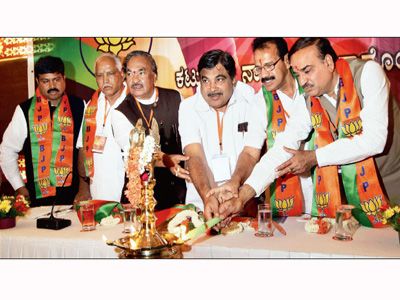
Bangalore, March 19:The Bharatiya Janata Party’s (BJP) maiden rule in Karnataka is set to end as a sordid tale of scandals and compromises.
Two days ahead of the budget presentation, more than half the party’s 23 ministers are holed up in a resort on the outskirts of Bangalore, devising a strategy to get rid of Chief Minister D.V. Sadananda Gowda. The assembly session starts Tuesday. The budget presentation is scheduled the next day.
Giving them company are scores of party legislators, all wanting the return of B.S. Yeddyurappa as chief minister though he still faces nearly a dozen corruption and illegal land deal cases.
He has been summoned by a Supreme Court appointed panel to appear before it in person or send a representative Tuesday to answer charges of making several hundred crore rupees by favouring iron ore mining companies.
The panel, the Central Empower Committee appointed by the apex court to study illegal iron ore mining in Karnataka and Andhra Pradesh, is to decide whether the charges against Yeddyurappa need to be probed by the Central Bureau of Investigation (CBI).
However grave these issues may appear to the people, for Yeddyurappa, largely credited with bringing BJP into power for the first time in south India in May 2008, they are of no consequence as his sole aim is to be chief minister.
This unbridled hankering after power has been given a boost by the reported division of opinion among the national leaders on reinstating him.
It is generally believed that BJP chief Nitin Gadkari and a few other central leaders do not mind Yeddyurappa coming back as chief minister.
But his return is said to be strongly opposed by senior leader L.K. Advani, who fears this will further damage the party’s image and take the sting out of its campaign against the scandals of the Congress-led central government.
Yeddyurappa claims he was asked by the national leaders to quit July 31, 2011 with the promise that he will be brought back if a court clears him of charges of taking money from mining companies in return for favours.
Then Lokayukta (ombudsman) N. Santosh Hegde had July 27 recommended Yeddyurappa’s trial on the ground that his family members had received Rs.30 crore from two mining companies. This amounted to corruption.
The high court on March 7 quashed the Lokayukta findings and also the case against Yeddyurappa, which he has seized to demand that party national leaders honour their word.
The national leaders appear to be paying for the compromise formula they devised to make Yedddyurappa quit, though by that time he was already facing six cases of corruption and illegal land deals filed by two Bangalore advocates.
Both he and the party dismiss these cases as politically motivated.
Yeddyurappa’s lucky -- the institution of the Lokayukta in Karnataka, the first state to set it up, has been headless since September and there is no one to decide whether to challenge the high court ruling in the Supreme Court.
There are two Upa Lokayuktas (deputy ombudsmen) S.B. Majage and Chandrashekaraiah (only one name). While Chandrashekaraiah has said the high court verdict should be challenged, Majage is silent.
BJP’s rule in Karnataka began with several compromises - over ministry formation and giving all five independents who helped the party gain majority in the assembly cabinet berths.
Then followed rebellion, twice, by mining baron Reddys against Yeddyurappa.
At least 20 of BJP's 120 legislators have been involved in scams - from rape to porn viewing to illegal land deals.
As BJP enters last year of its first term in office, it is Yeddyurappa’s turn to don the mantle of the rebel.





Comments
Add new comment